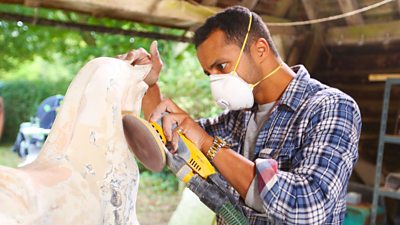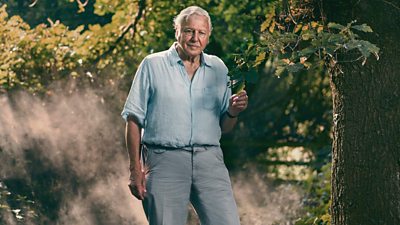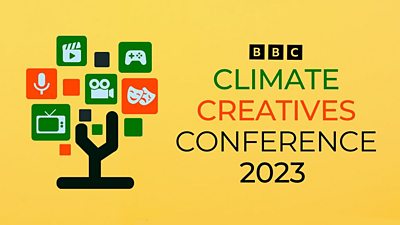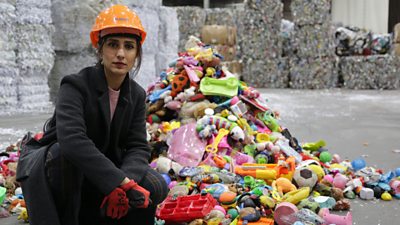We know that our audiences are increasingly aware of the challenges facing the planet from climate change and the loss of biodiversity, with 57% of people claiming it was ‘very important’ to them and 32% rating it as ‘fairly important’ in our latest audience research. As programme makers it’s important we reflect this onscreen and see it as a creative opportunity to connect with audiences about a subject they really care about which is relevant to their lives. We've joined other broadcasters in to reach more audiences with content that informs and inspires them on this topic.
As part of our commissioning process all the producers we work with must have a conversation with their commissioner about how they can reflect sustainability or the environment onscreen. To support this, below are some ideas about how different genres can include, explore and portray climate themes and sustainable behaviours in their editorial either implicitly and explicitly, along with audience research and further resources.
Explicit and implicit inclusion - what we mean
Every programme is unique and we don't expect all our content to directly deal with climate change or sustainability. In fact, a powerful way to engage with the environment is through non-specialist content that takes sustainability into everyday experience. We refer to the different types of editorial inclusion as either explicit or implicit.
Explicitly:
Through specific examinations or debate of environmental themes, either as the main subject or just incidentally, in passing.
Implicitly:
Through portrayals of sustainable behaviours that aren’t directly commented on.
Ideas for sustainable portrayal
Below are tips for considering how sustainable behaviours and themes could be included in your programme.
How are people getting around? Consider:
- Sustainable ways to travel such as electric cars, bikes or public transport.
- Active transport like cycling and walking.
- Think carefully about glamourising unsustainable choices around travel.
What are people eating/cooking and what’s their relationship with food? Consider:
- Sustainable choices for food, or being offered, debating or discussing vegetarian or vegan options.
- Ways to reduce food waste and composting.
What are people’s homes like and energy use? Consider:
- Enhanced home insulation and alternatives to gas boilers (such as heat pumps).
- Turning the heat down and wearing jumpers.
- Low energy lights, green tariffs, switching off appliances.
- Solar shading (blinds etc) to cope with higher temperatures.
- Solar panels and wind generation (on houses and in the landscape).
What stuff do people wear, have and buy? Consider:
- Buying less and more sustainable products.
- Recycling or repairing and reusing broken items.
- Reusing outfits. Wearing or buying second hand clothes and other items.
- Reusable shopping bags or carrying reusable water bottles and travel mugs.
- Background advertising with sustainable themes (eg generic ‘green’ products or campaigns).
- Think carefully about glamourising unsustainable and high carbon lifestyles.
What’s people’s relationship with nature and access to it? Consider:
- An appreciation of nature and the natural world – from window boxes to the great outdoors.
- Planting and restoring nature.
- Access to green spaces.
What do people do for work and with their money? Consider:
- Jobs or work scenarios related to environmental sustainability.
- Jobs or work scenarios that will be affected by the transition to net zero – eg oil and gas workers, farmers, boiler fitters.
- Sustainable investments and pensions.
What do people talk about and do in their communities? Consider:
- Sharing, discussing or debating a particular facet of climate change, potential solutions or an area of concern with friends, communities and colleagues.
- Involvement of/with local groups and politicians on the subject.
Is climate change impacting them already? Consider:
- Extreme weather events (flooding, heat waves, wildfires, droughts, intense storms).
- Events being cancelled or altered or travel plans changing because of extreme weather or air pollution.
- Relocation due to climate impacts.
- Asthmatic characters coping with the impact of air pollution, or other physical health impacts of climate change (such as heatstroke and heat exhaustion).
- Mental health impacts of climate change – climate anxiety, stress and grief for the loss of the natural world (particularly relevant for young people, and for those who have experienced extreme weather like flooding).
These are thought starters and are neither prescriptive nor exhaustive. It’s also important to remember that not everybody needs to feel the same way. The vast majority of people care about the environment, but not everybody is ‘signed up’ to the same actions. It can be a point of narrative tension.

In scripted content
The potential is huge in scripted. What do your characters think about the environment and climate change? How does that inform their behaviour and world view? What does this mean for where and how they live? For what they do? What does their world look like?
Not all jokes need to be green, but comedy can be a way of exploring climate themes – such as Romesh Ranganathan regularly referring to his veganism. Other comedians’ work on this topic to check out includes Dr Matt Winning and Mark Thomas.
Implicit
His Dark Materials and EastEnders both show sustainability implicitly by featuring billboards on green themes in background shots. EastEnders also includes electric vehicles, an EV charging point in Albert Square, recycling bins and reusable bags as well as The Albert, which is a vegan café during the day.
Explicit, incidental
I May Destroy You featured the main character Arabella being recruited as a presenter at a start-up vegan company. A climate-changed UK was the backdrop for Years and Years.
Explicit, main theme
The Trick tells the story of the 'Climategate' hacking controversy. The Doctor Who episode Orphan 55 directly explored climate change.


In non-scripted content
Science and natural history have long been a way of explicitly exploring the climate and environment, but there are lots of other ways to approach the topic in unscripted programmes including in entertainment, daytime and sport – from cooking shows to quizzes, shiny floor extravaganzas to FA Cup matches.
And as climate is part of all our lives, it is part of your presenters’ and contributors’ too. What do they think about the environment and climate change? How does that inform their behaviour and world view? What does it mean for where and how they live? For what they do? Is this relevant to the story that you are telling?
Implicit
Antiques Roadshow and The Repair Shop both explore the value of the stuff we already have. Our cookery shows feature vegetarian and vegan recipes.
Notable examples from other broadcasters include personalised water bottles on Love Island and Ewan McGregor and Charlie Boorman traveling America on electric motorbikes for the Long Way Up.
Explicit, incidental
The Great British Sewing Bee features a reduce, re-use, recycle week, where contestants sew new garments from charity shop clothes and soft furnishing fabrics, reminding audiences of the benefits of up-cycling.
DIY SOS has featured green builds.
There are green prizes in Richard Osman’s House of Games and careful casting can bring themes to the fore – such as a contestant who runs a food waste business in Ready, Steady, Cook.
Sustainability related items regularly feature on Morning Live and The One Show.
Explicit, main theme
Science and natural history: Blue Planet II, Extinction: The Facts, Horizon: Feast to Save the Planet and The Royal Institute Christmas Lectures.
Popular factual and factual entertainment: Shop Well for the Planet? and War on Plastic with Hugh and Anita.
Sport: Sport 2050.
Children's and Education: Planet Defenders and The Regenerators.



Audience research and resources
Find out more about how audiences view sustainability and climate change.
±«Óãtv Audiences sustainability research
Our latest ±«Óãtv Audiences sustainability tracker research suggests that the environment continues to be an important topic to the UK public, with recent tracking suggesting that 57% of people claim it’s ‘very important’ to them and just 6% ranking it of ‘low importance’.
The DESNZ Public Attitudes Tracker
A UK Government survey from summer 2023 indicates that as much as 82% of the public say they are either 'fairly concerned' (42%) or ‘very concerned’ (40%) about climate change, with just 2% reporting 'I don’t think there is such a thing as climate change'.
The tracker also indicates the UK public cite TV and Radio documentaries as their most trusted source of information after scientific organisations and scientists on climate change, with 71% trusting us to provide accurate information.
±«Óãtv Engaging audiences with sustainability guide
Find out more about how audiences view sustainability and climate themes as well as how they can be reflected onscreen in our guide.
-
PDF
Further editorial resources
Visit the sustainability homepage-
 In depth information and glossary on a range of climate topics
In depth information and glossary on a range of climate topics -

Producers end-to-end production guide
Everything you need to know across production and editorial -
 Further research to better reflect our audiences
Further research to better reflect our audiences -

±«Óãtv audiences sustainability research
Insights from our latest audience tracker -

Climate Creatives Festival
Watch recordings of the ±«Óãtv event -
 Case studies and guidance from albert
Case studies and guidance from albert
Please note the ±«Óãtv is not responsible for the content of external websites.
Explore the site
-
Briefs and contacts
Commissioners and ideas -
Supporting indies
How we commission and work -
Skills and training
Industry training and skills development
